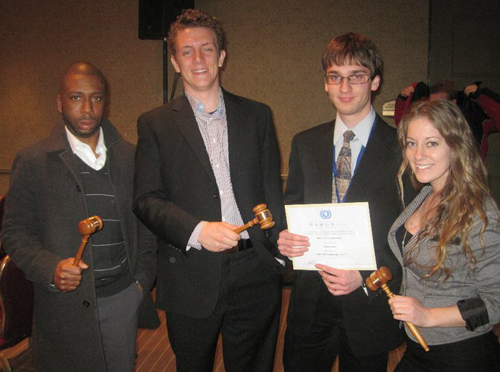
When PhD student Marika Jeziorek arrived at the University of Guelph, she was interested in taking part in a Model United Nations conference. Since she was majoring in political science and international development, it seemed like a natural way to apply some of what she was learning. And her participation in the G8-G20 2010 Youth Summit in Vancouver showed her the importance of young people being involved in international dialogue.
Finding no group of students preparing for the Model UN, Jeziorek began sending out emails, contacting departments, and working to assemble a group of interested students. She ended up with 18 participating as part of the U of G delegation when the North American Model UN ran Feb. 24 to 27 at the University of Toronto. More than 20 schools, most from the United States, and more than 300 students took part.
Jeziorek says Guelph’s participation was made possible by several sponsors: Office of the Provost and Vice-President (Academic), Student Affairs, and both the Office of the Dean and the Student Alliance in the College of Social and Applied Human Sciences. Furthermore, the whole team, and especially Aaron Francis, Senka Grahovac, Shamu Mosonyi and Vanessa Craig, put in a lot of effort and hard work. “It was my idea and leadership, but many people contributed to making it possible,” says Jeziorek.
For the delegates, the conference required many hours of research and writing. “Reading week consisted of preparing for the conference, writing a paper for the conference, attending the conference, and getting about five hours of sleep a night,” says Geoff Loughton, a fourth-year political science student. Each delegate was assigned a country to represent, a committee to belong to, and some topics to discuss. That meant researching not only the topic but also the assigned country’s point of view on the issue.
Delegate Vanessa Craig, a first-year international development student, was part of the model Security Council, which dealt with crises. “Some were things the conference staff had made up for us to work on, but we also dealt with things that were actually going on in the world, such as the events unfolding in Libya and Egypt,” she says. “Some of the issues we discussed were actually occurring in the real UN Security Council the next day as they tried to resolve the crises.” As the only Canadian on the conference council, Craig found it interesting to hear different perspectives on an issue.
The council had an extra challenge ─ an overnight session that went from 1 to 5 a.m., just as real crisis meetings must sometimes do.
Stephanie Bishop, also a first-year student in international development, says she was surprised by how much she enjoyed the experience. “I was so nervous before we went, feeling stressed about my paper and whether I had enough research, but it turned out to be a lot of fun.” Social events every evening allowed the students to get to know each other, and Bishop adds that “it was great to meet people who want to know about and want to do something about the issues in the world today. It gives me hope for humanity and hope for the future.”
Loughton says the conference “changed my perspective on the United Nations. As a political science student, I tend to be very cynical, especially about the United Nations. I saw it as a large bureaucracy where everything just got mired in red tape. Being part of this event showed me that the world body is only as good or bad as the people in it. Seeing so many young people with creative solutions for world problems gave me a lot of hope.”
Another unexpected benefit for Loughton was making connections with some of the U.S. students who took part. “It was great to go to the pub with American political science students and talk to them about health care, Obama and other issues.”
At the conclusion of the three-day conference, awards were handed out for best delegate, outstanding delegate and honourable mention on each committee. Four of the Guelph delegates won awards: Geoff Loughton (Best Delegate, Economic and Financial Affairs Council, representing Switzerland), Stephanie Bishop (Best Delegate, Human Rights Council, representing Switzerland), Aaron Francis (Best Delegate, Chinese Politburo, representing Li Changchun) and Shamu Mosonyi (Honourable Mention, Legal Council, representing Switzerland).
Jeziorek was pleased to have a number of first-year students participating. “That means they’ll be around for the next few years to keep this moving,” she says. For her, though, this has been more than an academic experience: “I definitely want to work at the United Nations one day.”